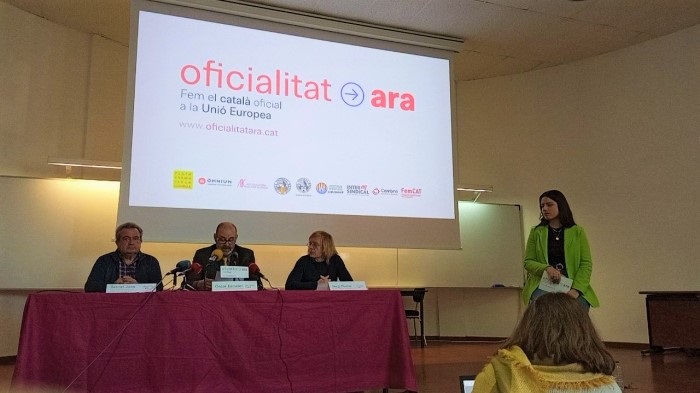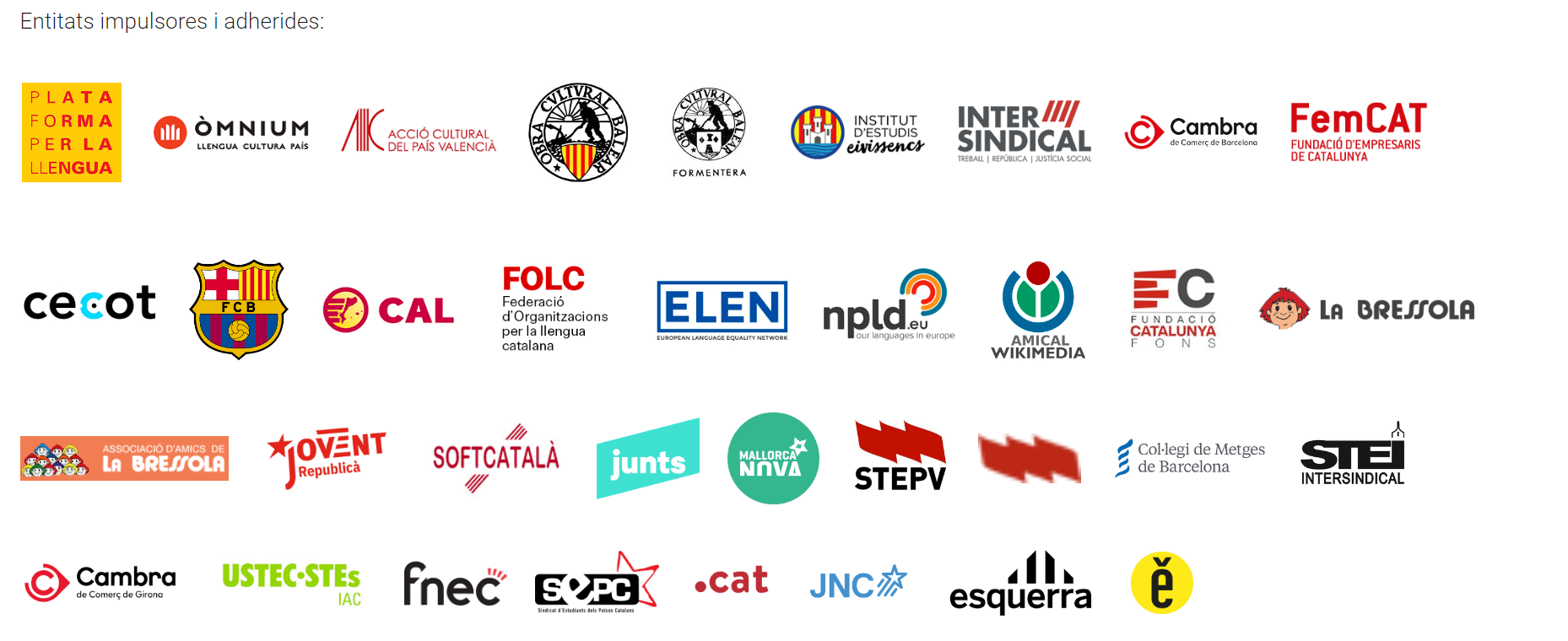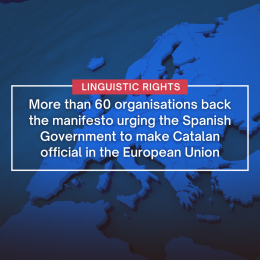More than 60 organisations have already backed the manifesto to demand that the Spanish Government make Catalan official in the European Union, taking advantage of the fact that this July the Spanish State will take on the rotating presidency of the EU Council. The manifesto, presented in Palma on 13 February and initially promoted by nine organisations, has now been signed by Futbol Club Barcelona, the Barcelona Medical Association, the Balearic Island trade union STEI Intersindical, the Valencian Intersindical, the employers' organisation CECOT, Girona Chamber of Commerce, the teachers' union USTEC-STEs and the international association the European Language Equality Network (ELEN). The text, which can be consulted on a website, has also received clicks of support from almost 50,000 individuals. The promoters are appealing to organisations to continue signing up to it via the e-mail address info@oficialitatara.cat, and they are encouraging citizens to continue giving their support on the website.
Specifically, the manifesto demands that the Spanish Government request the recognition of Catalan as an official European Union language, on the understanding that no treaty needs to be amended in order to do this and that it is simply a matter of political will. It should be borne in mind that Regulation number 1 of the Council of the European Union of 1958 lists the official languages of the Union (there are currently 24 of them) and that this regulation has been amended seven times by the States.
The promoters of the manifesto complain that Catalan's lack of official status in the European Union means it is discriminated against in many regulations and is losing social prestige. They also claim the language rights of Catalan speakers are being contravened in many areas. As the text says, it must be understood that "every year, the European institutions approve regulations that govern aspects related to language" that "member States must transpose" into their legal systems and that "in many cases, they establish that certain precepts or obligations must be met in one of the official languages of the European Union". This was translated last year, for example, "into 47 regulatory provisions with requirements that entailed the automatic exclusion of Catalan because it is not an official language".
For the organisations promoting the manifesto, it is an "anomaly" that "the 13th language of the Union in terms of number of speakers does not have the same recognition as many other European languages", and this is "contrary to the founding European principle of the protection of the multilingualism, enshrined in Article 3 of the Treaty on the European Union and the EU's Charter of Fundamental Rights". Similarly, the lack of official status also goes against the final report of the Conference on the Future of Europe, "one of the most important participatory processes in the history of the EU", which "calls for more protection for the so-called 'regional languages', such as Catalan".

Image of the presentation of the "Official Status Now!" manifesto in Palma
More than 60 organisations have already given their support to the "Official Status Now!" manifesto
The "Official Status Now!" manifesto was initially promoted by nine organisations: Plataforma per la Llengua, Òmnium Cultural, Obra Cultural Balear, Acció Cultural del País Valencià, La Intersindical (Catalonia), the Barcelona Chamber of Commerce, l'Institut d'Estudis Eivissencs, la Fundació d'Empresaris de Catalunya - FemCAT and Obra Cultural Balear de Formentera.
In the last few weeks, however, new organisations have signed up, and they now total more than 60: Barcelona Football Club, the Barcelona Medical Association, the teachers' union USTEC-STEs, the employers' organisation CECOT, Escola Valenciana, Mallorca Nova, the Fundació .cat, SoftCatalà, Amical Wikimedia, La Bressola, Associació d'Amics de la Bressola, Coordinadora d'Associacions per la Llengua Catalana (CAL), Federació d'Organitzacions per la Llengua Catalana (FOLC), Sindicat d'Estudiants dels Països Catalans (SEPC), Federació Nacional d'Estudiants de Catalunya (FNEC), Fundació Catalunya Fons, the political parties Junts and ERC, Jovent Republicà, la Joventut Nacionalista de Catalunya (JNC), Intersindical Valenciana, Sindicat de Treballadors de l'Ensenyament del País Valencià (STEPV), the STEI - Intersindical de les Illes Balears trade union, Girona Chamber of Commerce, the Societat Coral El Micalet in Valencia and the international associations the European Language Equality Network (ELEN) and the Network to Promote Linguistic Diversity (NPLD).

Associació Llengua Nacional, Associació d'Amics de la Poesia in Argentona, Associació de Guies Catalans del Món, Societat del Diccionari Enciclopèdic de Medicina, Cantaires de Ponent, Associació Romaquí, the cooperative school Es Liceu, Centre d'Estudis Argentonins, the Argentona Residents' Association, the Grup d'Historiadors Jaume Compte, Associació de Fotògrafs in Pineda de Mar, Associació Cultural Mare Nostrum, Centre d'Estudis de la Noviolència Catalunya, Agrupació Borrianenca de Cultura and Aula d'Extensió Universitària in Argentona have also signed the manifesto.




